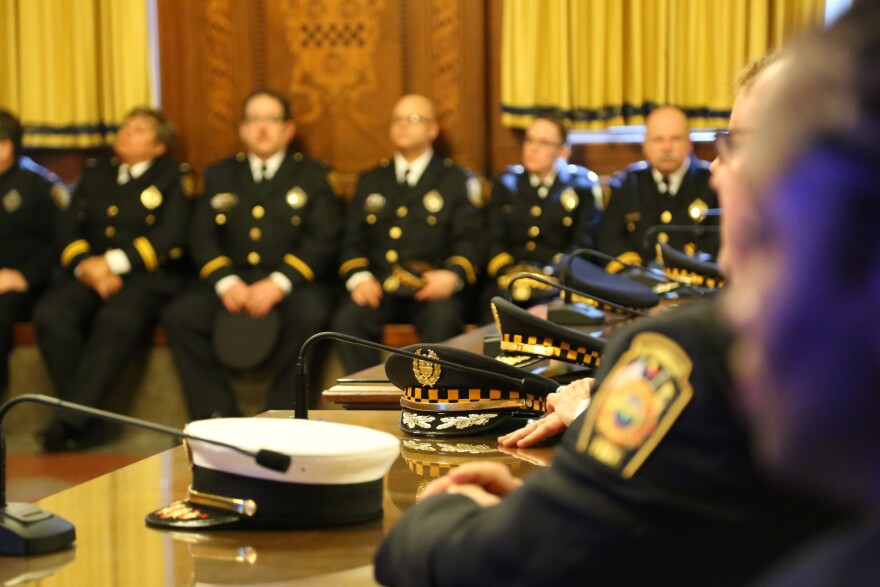Pittsburgh’s police department had 84 police recruits last year, and according to a yearly statistical report released last week, only four of them were black. That’s less than 5 percent of the class, in a city where African Americans make up roughly one-quarter of the population.
The city, like many others nationwide, has struggled to diversify its police force for decades. And officials have taken steps to open up the hiring process. In 2016, Mayor Bill Peduto told WESA that thanks to new efforts to broaden recruitment, the city was “turning the corner” on the issue, citing a recent class in which six out of 28 recruits were black. In 2017, the recruiting class included 13 African Americans out of 70. Overall, the police force is 13 percent black.
Congratulations to our 24 new #Pittsburgh Police Officers!!
— Pittsburgh Police (@PghPolice) July 3, 2019
Family and friends filled CCAC to celebrate the graduation of Recruit Class 18-03. 🎓👮👮♀️🚔 pic.twitter.com/AEEPub6b8m
Pittsburgh City Councilor Daniel Lavelle is chair of council’s committee on public safety, and he said the new numbers are disappointing. But he said he suspects much of the problem lies with a lack of interest among younger African Americans.
"I do think there is a social disconnect, because of some of the things within our recent past that have occurred between the African-American community and the police where many don't see themselves as wanting to go into the police force," he said.
But he said the city is still doing what it can to reach out, including eliminating any potential biases in the application process, he said.
"We've made it more accessible to take the tests in numerous places, we've run additional classes so that it's not a one-time shot," he said.
One reform includes removing the names on applications as applicants are evaluated.
"There was the belief at one point that if ... Joe Smith's name was on the [application], there may be someone who knew Joe Smith ... and they would get favorable consideration," he said
In a statement, a spokesman for Mayor Bill Peduto said over the past two years the city has added a focus on using "digital and social media to reach as many individuals as possible, and have attended dozens of job fairs and networking functions as well."
"Officials from Mayor Peduto’s office, the city’s human resources department and the police bureau have met regularly to study new recruitment strategies and issues in the application process that may be hindering fuller participation," said city spokesman Tim McNulty. "They are discussing increased recruitment among individuals already on law enforcement tracks (such as working as security guards, or being ROTC students), seeking more minority members of the force to serve as mentors to applicants ... studying educational requirements, and other issues."
Some would-be officers may struggle with qualifications needed at the outset, like a requirement that an applicant have at least 30 semester college or trade school credits. By the time an applicant is considered eligible for an academy class, they must have completed at least 60 credits. Applicants who don't reach the requirement can request a one-year civil service education waiver or deferment.
Beth Pittinger with the Pittsburgh Citizen Police Review Board said that should not be a hindrance for applicants.
"Accessibility has much improved, community college is affordable and it shows that to pursue those 60 credits it's reasonable,” she said.
Pittinger said reducing qualifications would mean there would be "a different-caliber person the streets, and I don't think that is palatable to our community at this point in time."
Hiring practices have led to court action in the past. A federal consent decree in 1975 required that recruits be hired in groups of four: one African-American male, one African-American female, one white female, and one white male. That practice was deemed unconstitutional in 1991.
The recruitment of women has also lagged since: Women made up less than 10 percent of last year’s recruits. The force is 15 percent female.
In 2012, during the administration of Mayor Luke Ravenstahl, the ACLU of Pennsylvania sued the city for allegedly discriminating against minorities throughout the recruiting process. Sara Rose, a senior staff attorney for the ACLU, said black applicants faced a number of challenges, including discrimination in background checks.
"The background investigation was really troubling," she said. "We had a lot of evidence that there were things in white officers' background that were overlooked that would disqualify African-American applicants,” such as DUIs and traffic violations.
The lawsuit was settled in 2015, but Rose says the numbers show little progress since then.




